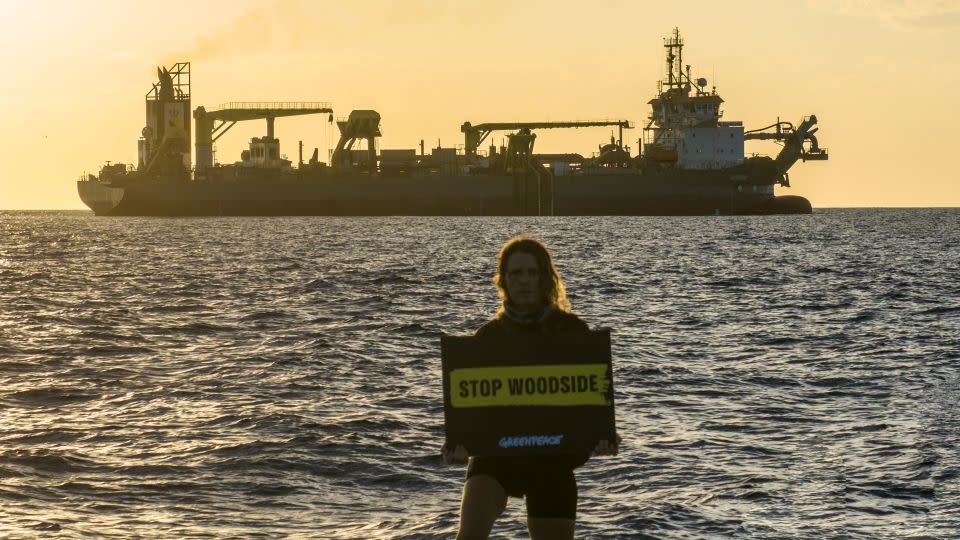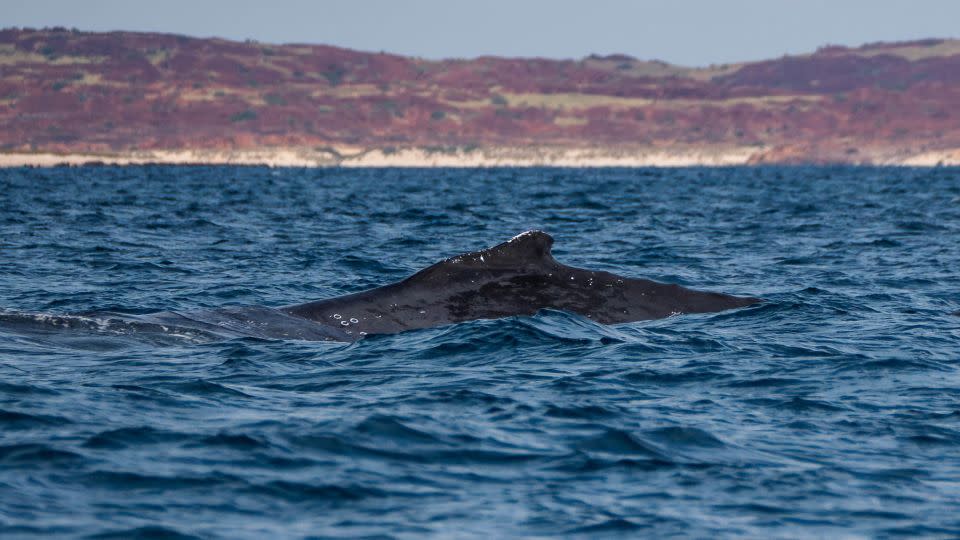Activists win court ruling to pause seismic blasting for gas off Australia’s western coast
Activists in Australia have succeeded in pausing planned seismic blasting off Western Australia, which they say could deafen and ultimately kill endangered migratory whales.
The Federal Court on Thursday invalidated approval given to oil and gas company Woodside Energy to start underwater blasting to locate large gas reserves in the Scarborough gas field.
Justice Craig Coleman found that NOPSEMA, Australia’s offshore oil and gas regulator, did not have the statutory power to accept Woodside Energy’s environment plan because it wasn’t reasonably satisfied that all relevant stakeholders had been consulted.
Mardudhunera woman Raelene Cooper had sought an injunction to stop the blasting because she said she and other traditional custodians of Murujuga, also called the Burrup Peninsula, hadn’t been properly consulted.
On Thursday, Cooper said she was “elated” by the ruling.
“No one is more relevant to consult about the threat posed by Woodside’s Burrup Hub than Traditional Custodians of Murujuga with cultural, spiritual and family connections to our sacred ngurra (home),” she said in a statement.
“Woodside … never bothered to sit down and listen to Murujuga Traditional Custodians about the full impacts of their Burrup Hub operations on our culture and our sacred Songlines,” she said, according to a statement.
Woodside said in a statement Thursday that it would work with NOPSEMA to gain new approval for the blasting, adding that the court “did not in any way criticise any action by Woodside.”
“We have consulted extensively on our environment plans, dedicating time and effort so our approach to environmental management and EP consultation meets our current understanding of regulatory requirements and standards,” it said.

Huge gas project
Woodside Energy plans to extract millions of tons of gas from the Scarborough field, about 375 kilometers (233 miles) off the coast of Western Australia, mostly for export to Asia.
The project was signed off by the previous Australian government led by Scott Morrison, however it retains the support of Prime Minister Anthony Albanese’s administration, despite its pledge of achieving net zero emissions by 2050.
Gas is generally less carbon-intensive than coal, but it’s still a planet-warming fossil fuel, and there is a growing understanding that its infrastructure leaks huge amounts of methane – a more potent greenhouse gas than carbon dioxide in the shorter term.
Australia’s offshore oil and gas regulator, NOPSEMA, approved the blasting in July, despite acknowledging that Woodside may not have identified all Indigenous people in need of consultation on the seismic blasting plans, or given them adequate time to be consulted.
During seismic blasting, airguns fire compressed air toward the ocean floor and the soundwaves penetrate the seabed before bouncing back to receivers towed by a boat. The pattern of the soundwaves gives geologists an indication of oil and gas reserves trapped under the ocean bedrock.
According to the Australian Marine Conservation Society, the noise can reach 250 decibels, around a million times “more intense” than the loudest whale sounds.
“Now, that’s really problematic if you’re a whale because whales depend on their hearing for everything – to navigate, to find their mates and their food,” said Richard George, Greenpeace Australia Pacific senior campaigner.
“So, a deaf whale is a dead whale.”
Woodside Energy provided CNN with its marine environmental plan for Scarborough dated June 2023.
The document lists dozens of threatened and migratory species of sharks, mammals, reptiles and birds that can be found in the vicinity of the blast zone, including loggerhead and leatherback turtles, great white sharks and pygmy blue whales.
Greenpeace said Woodside’s plans “skirt close” to a major migration route for pygmy blue whales, a smaller subspecies of blue whale that travels north each year from the Antarctic into waters off Australia’s northwest.
The population size of pygmy blue whales is unclear, but the Australian government considers the mammal to be endangered.
The government’s species profile warns about the dangers of “man-made noise” to the whales, saying it can “potentially result in injury or death, masking of vocalisations, displacement from essential resources (e.g. prey, breeding habitat), and behavioural responses.”
“Potential sources of man-made underwater noise interference in Australian waters include seismic surveys for oil, gas and geophysical exploration,” the profile adds.
However in its environmental report, Woodside said any impact on whales would be short term.
“There will be no lasting effect on whales, however there could be short term hearing impacts,” Woodside wrote in its report.
The company also said it “will have dedicated marine fauna observers and systems which can listen for whale song on some vessels” and that the “presence of whales can postpone activities.”

Fight for cultural heritage
For local Indigenous people, whales are not only treasured for their role in the ecosystem – they carry cultural significance for those whose ancestors have lived on the land for more than 60,000 years.
“A Songline gets carried by the Whales. It’s an ancient dreaming story, a story that has gone on for millennia,” Cooper explained to CNN.
“It’s what our ancestors left behind, they left us a story,” Cooper said. “Those animals represent a song, a dance that we as Indigenous people all over this continent hold.”
In its environmental plan, Woodside acknowledged the importance of marine habitats to the traditional customs and culture of Indigenous Australians.
“Woodside recognises the potential for marine ecosystems to include cultural features as well as environmental values,” the report said. “An impact to marine ecosystems has the potential to impact cultural values,” Woodside acknowledges, vowing to “adequately manage” that impact.
But the activists’ concerns extend beyond the sea – to ancient petroglyphs or rock art on Murujuga, also known as Burrup Peninsula, that Cooper and her group, Save our Songlines, fear will be damaged by emissions from the Scarborough project.
The art, believed to be 40,000 years old, contains some of the earliest depictions of human civilization and represent irreplaceable cultural links to the past.
Cooper told CNN she is also troubled by the idea her country could be contributing to the climate crisis with fossil fuels unearthed from below.
“It’s our sacred significant areas that are continually getting hammered,” she said. “Our people are being attacked. Our ancient history, our wildlife, our ecosystems, our water.”
Woodside Energy has calculated a total emissions cost of 878.02 megatonnes of carbon dioxide equivalent over its 50-year lifespan.
Campaigners say the projected emissions made a mockery of Australia’s stated commitment to reducing its reliance on fossil fuels.
“Scarborough is a part of the Burrup Hub, and that is Australia’s largest fossil fuel project. If it goes ahead we’re looking at emissions equivalent to 12 years of Australia’s greenhouse gas emissions,” said Greenpeace’s Richard George.
“So it is a disaster for our climate and it’s a disaster for our oceans as well.”
For more CNN news and newsletters create an account at CNN.com

